- Home
- James Luceno
Darth Plagueis Page 12
Darth Plagueis Read online
Page 12
OneOne-FourDee waited until he and Plagueis were well out of earshot of the Jedi to say: “Are we departing Abraxin, Magister?”
Plagueis shook his head. “Not before I find the Nautolan. I’ve no choice but to attempt to draw him out of hiding.”
“But should you call on the Force, you’re likely to attract the Jedi, as well.”
“The risk may prove worthwhile.”
They spent the afternoon eavesdropping on conversations about the locations of the killings, and determined that Naat Lare, whether he realized it or not, had been following a pattern. In the darkness at the edge of the settlement, at a spot along the bloodsucker-plagued shore of the dark swamp, some six kilometers from the market, Plagueis peeled out of his leggings, tunic, and bonnet, and slipped naked into the murky water. With an aquata breather clamped between his teeth, he propelled himself to the bottom. There, squatting in the muck, he opened himself fully to the Force and summoned the Nautolan, whose Force and olfactory senses might suggest that the mother of all marsh haunts was at hand for killing. A tattooed female Nautolan named Dossa had once been deemed suitable to serve Sith Lord Exar Kun; who knew what gifts Naat Lare might possess?
Surfacing to the riotous stridulations of insects, Plagueis leapt to the muddy shore, dressed, and perched himself in starlight on the slippery roots of a leafy tree. Shortly, he sensed an echo in the Force and saw ripples in the water some distance away. In the dim light, a blue-green nest of head-tresses broke the surface, followed by a pair of lidless maroon eyes. Then the amphibious sentient from Glee Anselm appeared, pulling himself ashore like some devolved beast and fixing his attention on Plagueis.
At the same time, Plagueis heard the sound of a water skimmer approaching rapidly from deeper in the swamp, and sensed the presence of the two Jedi.
“You’re not Venamis,” Naat Lare said in Basic, one hand on the hilt of a vibroblade strapped to his muscular thigh.
“He helped you escape Bedlam and sent you here as part of your training.”
Naat Lare’s hand closed on the hilt. “Who are you?”
Plagueis stood to his full height. “I am Venamis’s Master.”
The Nautolan looked confused, but only momentarily. Then he genuflected in the mud. “Lord,” he said, lowering his head.
The sound of the skimmer was closer now, just around a bend in the swamp. “Two Jedi have tracked you.”
Naat Lare’s tresseled head swung to the sound of the skimmer.
Plagueis began to retreat into the shadows, and into mundane nature. “Prove yourself worthy to me and Venamis by killing them.”
“Yes, my lord.” The Nautolan sprang to his feet and dived into the slime-covered water.
Deep in the leafy trees Plagueis waited. The skimmer’s motor went silent; then water surged and shouts of alarm and sudden flashes of light erupted in the night.
“Master!”
A harsh guttural sound rang out, followed by a scream of pain.
“Stand aside, Padawan.”
“Master, it’s—”
Another scream, higher in pitch.
“Don’t! Don’t!”
The thrum of an angered lightsaber, a howl of pain, and something heavy struck the water.
“Is he alive? Is he alive?”
Someone moaned.
“Wait …”
Waves broke on the rooted shore close to where Plagueis had concealed himself.
“Master?”
“It’s done. He’s dead.”
9: UNTAPPED RESERVES
For more than fifty years Damask Holdings had occupied one of Harnaidan’s most magnificent superspires. If not as soaring or massive as those belonging to the InterGalactic Banking Clan and its numerous subsidiaries, the building had the advantage of being constructed close to the largest of the city’s naturally heated lakes, which had been incorporated into the property as an exclusive spa. The company’s boardroom overlooked the lake and surrounding hot springs from an architectural setback on the two-hundredth floor, where Hego Damask, Larsh Hill, and the chief officers and executives of Damask Holdings convened for twice-weekly meetings. That day a one-quarter-life-sized holopresence stood at the center of the room’s enormous circular holotable, addressing the gathered Muuns in Basic from the far-removed world of Naboo.
A human of medium height, the speaker had dark brown hair combed straight back from a sloping forehead, a thick and lengthy beard and mustache, and bright blue eyes set in a symmetrical if unremarkable face. He was attired in layers of richly colored clothing, which included a vest embroidered with Futhork calligraphy and a brocade overcloak that fell to his knees, revealing tall, shiny, low-heeled leather boots. His name was Ars Veruna, and although he didn’t hold a position in Naboo’s monarchical government, he was speaking for the current pretender to the throne, Bon Tapalo, and was likely to be appointed governor of the city of Theed in the event of Tapalo’s election.
“Our campaign has been stalled by recent allegations from the leaders of some of the royal houses,” Veruna was telling the gathered Muuns. “Something has to be done to recapture momentum — and quickly. Counterallegations made public by an unknown benefactor went a long way toward undoing the initial damage of the nobles’ media releases, but a new wariness has gripped the electorate, strengthening the position of our provincial opponents.” “Audio cancellation,” one of the Muuns said toward the holosystem’s pickups. Secure in the knowledge that conversation around the table had been muted, he went on. “Are all the Naboo as hirsute and elaborately costumed as this Veruna?” Larsh Hill replied. “They are traditionalists — tonsorially as well as politically. The style of dress and facial adornments pay homage to the regalia of Queen Elsinore den Tasia of Grizmallt, who dispatched an expeditionary fleet of humans to the planet some four thousand years ago, and to whom some Naboo claim to be able to trace an unbroken ancestry.” “They are not, after all, as furry as Wookiees,” said another.
Hill grunted affirmatively. “In addition to humans, Naboo supports a hairless amphibious species known as the Gungans. Perhaps indigenous, perhaps not, but in no position to represent the planet in galactic dealings, in either case.” Seated with his back to the scenic view beyond the window wall, Plagueis studied the holoimage of Veruna. Generally he loathed politicians for their pretentions and ill-informed belief that wealth and influence conferred true power. But politicians were a necessary evil, and, if nothing else, Veruna burned with greed and ambition, which meant that he could be manipulated if necessary.
The missions to Lianna, Saleucami, and Abraxin were still fresh in his thoughts. On a philosophical level he understood why the generations of Sith Lords that had preceded him had trained apprentices, to whom they had bequeathed their knowledge of the dark side of the Force in anticipation of an eventual challenge for superiority. But with the Grand Plan culminating, it made no sense to challenge or kill beings of equal power unless they posed a threat to Plagueis’s personal destiny. The Sith line would continue through him or not at all. Thus the need for a partner rather than an underling; a cohort to help put into play the final stages of the imperative. It had long been his belief that the dark side would provide that one when the time was right.
Plagueis hadn’t anticipated having to turn his attention quite so suddenly to Naboo, but with the Trade Federation still grumbling about his support for the Outer Rim free-trade zones, and the Gran worried about losing Podrace revenues to Gardulla the Hutt, there were ample reasons for getting down to business. More important, Plagueis had long sought a planet that Damask Holdings and the steerage committee members could use as a base of operations. The possibility of having a future King at their beck and call was an added bonus, and even such unlikely players as Boss Cabra stood to profit from the Muuns’ securing of Naboo.
It was during his absence from Muunilinst that Larsh Hill and some of the others had made overtures to the group vying for the throne of Naboo. In exchange for financial and logistical support in the
upcoming election, Damask Holdings had asked for exclusive rights to transport plasma from the as-yet-untapped reservoir the Subtext Mining Group had recently discovered deep beneath the plateau that supported the capital city of Theed. Not every Naboo, however, was in favor of involving the planet in trade of the sort that would result from making plasma energy available, and a cadre of nobles had thrown their support behind Tapalo’s chief rival for the monarchy.
Reactivating the audio feed, Plagueis asked: “What was the nature of the allegations made by the royal houses?” “First, they leaked word of the mining survey we had performed,” Veruna said, “but the revelation failed to have the intended effect, because several members of the electorate favor opening Naboo to galactic trade. Then, when they learned of our initial talks with Damask Holdings, the nobles accused us of selling Naboo to the highest bidder — to, and I’ll quote—‘a shady, extra-system cartel of ruthless criminals.’ ” The human paused for a moment. “You should understand, Magister, that our world has yet to overcome a long history of forbidding outside influence. The royal houses realize that trade is a sensitive issue and are now advocating for Naboo to oversee the transport of plasma to other worlds. But frankly we lack both the funds and the expertise to make that a reality.” “How were the nobles able to learn of our overtures to you?” Plagueis asked.
“We haven’t been able to determine the source,” Veruna said.
Plagueis muted the audio feed and turned to Hill. “We need to consider that someone close to our organization may be responsible for this ‘leak.’ ” Hill and some of the others nodded in agreement.
“The royal houses need to be informed that a leap into the business of transgalactic shipping is ill advised,” Plagueis said when he had reactivated the audio feed. “Naboo will need funding, logistical support, and perhaps even Republic legislation, and it is precisely in those areas where Damask Holdings can serve as an intermediary. Actual funding would come from the InterGalactic Banking Clan, and other conglomerates would be involved in assisting Naboo in tapping the plasma and in the construction of a spaceport of sufficient size to handle the ships needed to transport it.” Veruna stroked his tapered beard. “Bon Tapalo will certainly want to address these points with the electorate.” Plagueis liked what he was hearing. “You mentioned certain counterallegations released by an unknown party.” “Yes, and I confess that we were as surprised by the information as anyone. It seems that our group is not the first to seek the advice and support of offworld interests. Roughly sixty standard years ago, at the height of a war between the Naboo and the Gungans, our monarch was killed, and it has now emerged that some members of the very same royal houses that oppose Tapalo struck a secret deal with a mercenary group to intervene in the war should the Naboo suffer further setbacks. Fortunately, the conflict was resolved without the need for outside help. In fact, as a result of that conflict, the monarchy has since been an elected rather than hereditary post.” “You say that the information came as a surprise,” Plagueis continued.
Veruna nodded. “The information had to have been provided by a source within the opposition.” It now fell to Larsh Hill to mute the feed.
“Veruna is correct. We were able to trace the release of the information to the young son of one of the nobles. In the hope of avoiding a scandal that could divide the electorate, the head of the royal house has perpetuated a lie that the Tapalo group chanced on the information and made it public, when actually only someone with access to the family archives could have discovered it.” His interest piqued, Plagueis said, “What is the name of the royal family?” “Palpatine.”
“And the son?”
“Just that. He goes by the cognomen alone.”
Plagueis leaned back in the chair to consider this, then said, “We may have found a potential ally — someone willing to keep us informed of the royals’ plans for the election.” “An agent,” Hill said. “An inside man, as it were.”
Plagueis canceled the mute function. “We wish to visit Naboo in order to discuss these matters face-to-face.” Veruna was clearly surprised. “A public appearance by you would allow us to refute any allegations of secret collusion.” “Then all of us have something to gain.”
Veruna bowed at the waist. “It will be our great honor to welcome you, Magister Damask.” Later it would be said by Naboo and Gungan alike that they couldn’t recall a colder winter than the one that followed Hego Damask’s autumnal visit to their world. The rivers and even the falls below Theed froze; the rolling plains and tall forests were blanketed three meters deep with snow; plasmic quakes rocked the Gallo Mountains and the Lake Country, the Holy Places and the undersea city of Otoh Gunga; and many of the egresses of the underwaterways that hollowed the planet were blocked by ice floes.
Tapalo and Veruna had insisted on sending one of Naboo’s signature starships to transport the Muuns from Muunilinst, and the sleek Nubian had set down at Theed spaceport, a small facility that would have to be enlarged twentyfold if Naboo hoped to one day become a player in galactic commerce. The city itself struck Plagueis as the very antithesis of Harnaidan; where the capital of Muunilinst was vertical, angular, and austere, Theed was low, convex, and condensed, dominated by rotundas crowned with verdigris domes or flat roofs and tiered towers supported by round-topped archways. A river and several tributaries ran through the place, spanned by filigreed bridges and plunging in a series of high falls from an escarpment to verdant flatlands below.
A cortège of air skimmers carried the black-robed Muuns through streets better suited to pedestrian traffic to the interior courtyard of an ancient palace, where pretender to the throne Bon Tapalo, Veruna, and several other human advisers and would-be ministers of both sexes were on hand to welcome them. Draped in shimmersilk robes and propped by boots with high heels, the bearded and blond-haired Tapalo already carried himself like a regent — albeit of a second-rate world — remaining seated while Hego Damask and the rest of the Muuns were introduced, and flanked by guards dressed in flare-skirted uniforms and armed with vintage blasters. Veruna, on the other hand, immediately fell into step alongside Damask as the Muuns were being escorted into the central building of the complex.
“As I said when we spoke weeks back, Magister Damask, we are honored by your visit.” “And as I told you then, we all have something to gain.” Damask turned slightly to look down at him. “Especially you, I suspect.” Veruna gestured to himself in question. “I—”
“Not now,” Damask said softly. “When the time is right, you and I will confer privately.” Under a broad arch and through a lobby of polished stone they moved as a group, ultimately arriving at a second small courtyard where several tables had been set up, some overflowing with food and drink, and the largest reserved for the Muuns. No sooner were they seated than servants appeared and began serving food, including various meats that the Muuns politely declined. The practice of consuming food while conducting business was one that Damask had grown to tolerate in his dealings with humans, but in secret he detested it.
For many years he had detested the company of humans, as well. Barbaric meat eaters that they were, humans were a highly evolved species. Given their native intelligence and shrewd faculties, they deserved to be treated with the same deference Muuns were afforded. And yet many of the galaxy’s sapient species considered themselves to be equal to humans, who had only themselves to blame. Unlike Muuns, humans had no compunctions about lowering themselves to the level of less advanced beings — the slow-witted, disadvantaged, needy, and pitiful — making a pretense of equality and demonstrating a willingness to work and sweat cheek-by-dewlaps alongside them. Instead of celebrating their superiority, they frequently allowed themselves to be dragged down into mediocrity. A Muun would no sooner accept a position as a starship pilot or a smuggler than he would a career diplomat or politician unless required to do so for the greater good of Muuns everywhere. Humans, though, could be found in every occupation. But what made them especially intriguing was their see
ming intent to spread themselves to the far reaches of the galaxy, without any sense of control or planning, at whatever cost, and using up world after world in their insatiable quest, as if their diaspora from the Core reflected some sort of species imperative. More important, the Force seemed not only to allow their unchecked dissemination but to support it. In human hands, Damask suspected, rested the profane future of the galaxy.
Naboo blossom wine was still being poured when the Muuns made their pitch to the Tapalo group, employing the courtyard’s holoprojector to provide a virtual portrait of what Theed and other nearby cities might look like ten years on. Funding by the IBC would be allocated to tapping the plasma reservoir beneath the plateau. At the same time, Outer Rim Construction and Assembly — one of Cabra’s companies — would build an enormous refinery on the site of what was currently parkland, overlooking the Verdugo Plunge, housing the technology inside a triple-domed structure of Neo-Classical design. The Muuns detailed how the cliff walls could be stabilized and the tributaries of the Solleu River rerouted without disturbing the existing architecture or Theed’s network of underground tunnels. Below the cliffs, the Trade Federation would enlarge Theed’s spaceport, constructing a massive landing platform that would follow the natural curve of the escarpment, and open a second commercial port at Spinnaker.
By the time the pitch concluded, Tapalo looked stricken.
“Clearly you’ve put a good deal of thought into this,” he said to Larsh Hill, “but is there no room in your plans for Naboo firms?” “The last thing we want is to have these construction projects be seen as signs of foreign occupation,” Hill said. “Our partners wish to work closely with Naboo’s own Plasma Energy Engineering and the Theed Space Vessel Engineering Corporation to make certain that the improvements are viewed as a cooperative effort. When the construction phases are completed, the refinery and the spaceports will be under your full control.” Some of the color returned to Tapalo’s face. “The opposition contends that Naboo will be forever indebted to the Banking Clan and the Trade Federation.” “Only until the plasma begins to flow,” Damask said. “I understand your trepidation. But the question you need to ask yourselves is whether you can win the crown without our help.” Separate conversations erupted at every table.

 Darth Plagueis
Darth Plagueis Memories End
Memories End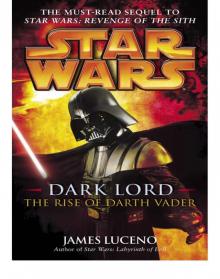 Star Wars: Dark Lord: The Rise of Darth Vader
Star Wars: Dark Lord: The Rise of Darth Vader Star Wars Darth Maul: Saboteur
Star Wars Darth Maul: Saboteur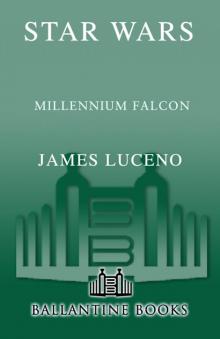 Star Wars: Millennium Falcon
Star Wars: Millennium Falcon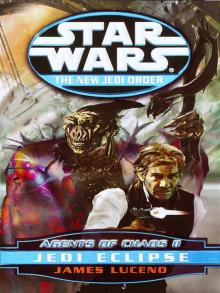 Jedi Eclipse
Jedi Eclipse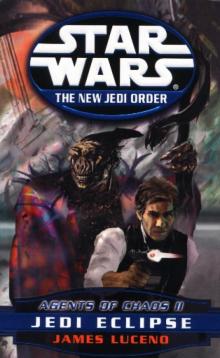 Star Wars The New Jedi Order - Agents of Chaos II - Jedi Eclipse - Book 5
Star Wars The New Jedi Order - Agents of Chaos II - Jedi Eclipse - Book 5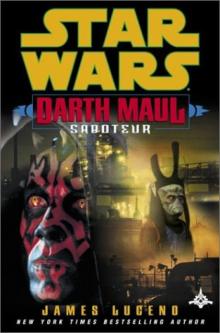 Star Wars - Darth Maul - Saboteur
Star Wars - Darth Maul - Saboteur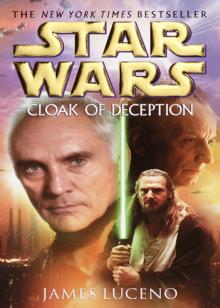 Star Wars: Cloak of Deception
Star Wars: Cloak of Deception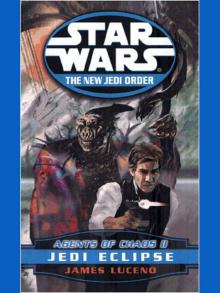 Star Wars: New Jedi Order: Agents of Chaos II: Jedi Eclipse
Star Wars: New Jedi Order: Agents of Chaos II: Jedi Eclipse End Game
End Game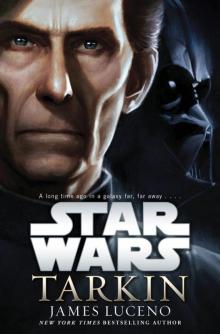 Tarkin: Star Wars
Tarkin: Star Wars Restraint
Restraint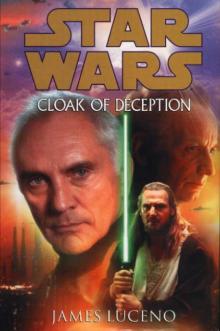 Star Wars - Cloak Of Deception
Star Wars - Cloak Of Deception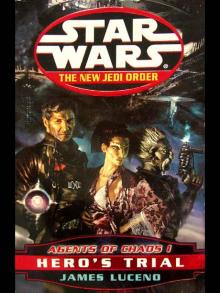 Star Wars: New Jedi Order: Agents of Chaos I: Hero's Trial
Star Wars: New Jedi Order: Agents of Chaos I: Hero's Trial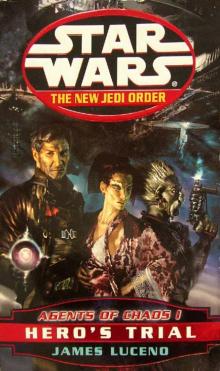 Star Wars The New Jedi Order - Hero's Trial - Book 4
Star Wars The New Jedi Order - Hero's Trial - Book 4 The Essential Novels
The Essential Novels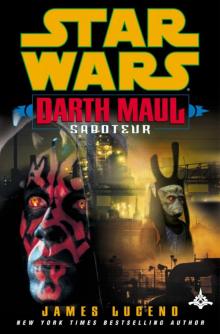 Darth Maul: Saboteur
Darth Maul: Saboteur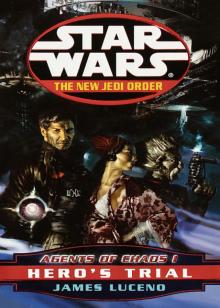 Hero's Trial: Agents of Chaos I
Hero's Trial: Agents of Chaos I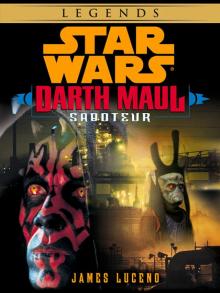 Saboteur
Saboteur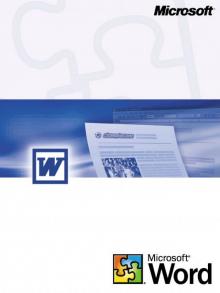 The Unifying Force
The Unifying Force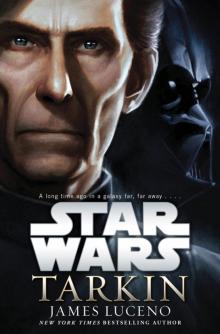 Tarkin
Tarkin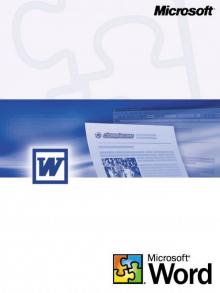 Dark Lord : The Rise of Darth Vader
Dark Lord : The Rise of Darth Vader Catalyst
Catalyst Book 0 - The Dark Lord Trilogy
Book 0 - The Dark Lord Trilogy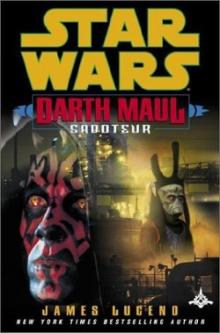 Darth Maul: Saboteur (star wars)
Darth Maul: Saboteur (star wars)